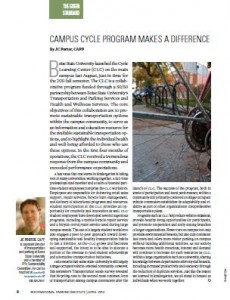Boise State University launched the Cycle Learning Center (CLC) on the main campus last August, just in time for the 2011 fall semester. The CLC is a collaborative program funded through a 50/50 partnership between Boise State University’s Transportation and Parking Services and Health and Wellness Services. The core objectives of this collaboration are to promote sustainable transportation options within the campus community, to serve as an information and education resource for the available sustainable transportation options, and to highlight the individual health and well-being afforded to those who use these options. In the first four months of operations, the CLC received a tremendous response from the campus community and exceeded performance expectations.
A key value that one learns in kindergarten is taking root at many universities: working together. A full-time professional staff member and a cadre of talented part-time student employees comprise the CLC workforce. Employees are responsible for delivering retail sales support, repair services, bicycle barn management, and delivery of educational programs and resources. Student participation at the CLC provides an opportunity for creativity and innovation as well. CLC student employees have developed several ingenious programs, including a mobile bicycle repair service and a bicycle corral/valet service used during large campus events. The use of a largely student workforce also engages a peer-to-peer approach toward developing sustainable and healthy transportation habits to last a lifetime. As the CLC grows and becomes self-supported, the intent is to be able to allocate a portion of the revenue to fund student scholarships and alternative transportation initiatives.
Data reflects that Boise State University is still largely a single occupant vehicle-oriented community. However, this semester’s Transportation Mode Survey revealed that bicycling rose to the second most common form of transportation among campus commuters after the launch of CLC. The success of the program, both in levels of participation and fiscal performance, within a community still primarily centered on single occupant vehicle commuters establishes its adaptability and viability as part of other organizations’ comprehensive transportation plans.
Programs such as CLC help reduce vehicle emissions, provide healthy living opportunities for participants, and promote cooperation and unity among branches of larger organizations. Fewer cars on campus not only provides environmental benefits, but also cuts commuter fuel costs and offers more visitor parking on campus without building additional facilities. As our society becomes more health conscious, interest and demand will continue to increase for such resources as CLC. Within a large organization such as a university, sharing knowledge between departments offers myriad benefits, including increased productivity and efficiency through the reduction of duplicate services. Just like the lesson we learned in kindergarten, we all stand to benefit as individuals when we work together.
JC Porter, CAPP, is assistant director of transportation and parking at Boise State University and a member of IPI’s Sustainability Committee. He can be reached at jcporter@boisestate.edu or 208.426.2457.
TPP-2012-04-Campus Cycle Program Makes a Difference

